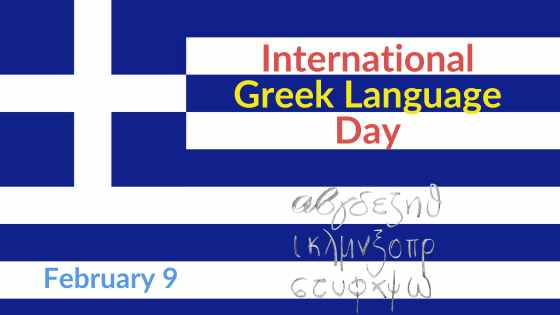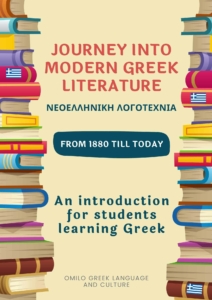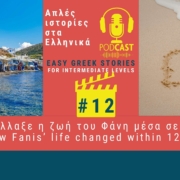Every year on February 9th, people around the world celebrate International Greek Language Day (Παγκόσμια Ημέρα Ελληνικής Γλώσσας).
This day honours the Greek language and its important role in literature, science, philosophy, and world culture. Greek, known as “Ελληνικά” in Greek, is one of the world’s oldest recorded living languages, with a history spanning over 3,400 years. It has influenced many other languages, including English, French, Italian, and Spanish.
Why the International Greek Language Day is celebrated on February 9th?
This special day was officially established in 2017.
The date was chosen to honour Greece’s national poet, Dionysios Solomos (April 8, 1798 – February 9, 1857).
Solomos wrote the poem Hymn to Liberty, which later became the Greek national anthem.
His work demonstrated how the Greek language helped preserve Greek identity and culture.
If you are interested to learn more about the Greek national anthem and the Greek Independence day, then click here
Omilo and The Evolution of Greek Language Learning
When the Omilo school was founded in 1996, the International Greek Language Day did not exist yet.
Back then, only 3 schools in Greece offered Greek courses for foreigners, and there were very few learning materials.
Over the years, more resources have become available, making Greek learning easier.
Not sure what Omilo means? It is a very Greek word, verb, and still used today
Click here to read more about it, and learn about etymology
In the meantime,
Omilo has contributed to this progress by teaching Greek Language and Culture to thousands of students in various locations in Greece.
And now, in 2026, we are proud to celebrate 30 years of Omilo!
If you want to join one of our programs this year, click here for an overview of our courses this year.
Apart from the Greek courses in Greece,
at Omilo we also create a lot of fun and practical Greek learning materials;
Language books, Podcast stories, Easy Readers and Workbooks, Verb books, etc..
Because at Omilo we do not have a webshop, but concentrate on Greek courses in Greece.
our materials are available through the eShop masaresi.com
Click here to get a better idea
https://masaresi.com/shop/
Historical Background of the Greek Language
The history of the Greek language is divided into several periods:
- Mycenaean Greek (14th–13th centuries BCE): The oldest form of Greek, recorded in the Linear B script on clay tablets. This language used syllables instead of letters to create meaning.
- Ancient Greek (9th/8th century BCE–6th century CE): This includes Classical and Koine Greek, the latter being the language of the New Testament.
- Medieval Greek (4th–15th century CE): Also known as Byzantine Greek, it developed after the spread of Christianity.
- Modern Greek (15th century–present): The language as it is spoken today, with some regional dialects.
The Greek Alphabet and Linguistic Features
Greek uses its own alphabet, consisting of 24 letters. It was adapted from the Phoenician script, from the region of modern-day Syria, Libanon and northern Israel. Greek became the basis for the Latin, Cyrillic, Armenian, and other alphabets. It was the first writing system to include separate symbols for vowels and consonants, influencing modern alphabets worldwide.
Click here to learn the 24 letters of the Greek Alphabet
Greek is the official language of Greece and Cyprus and one of the 24 official languages of the European Union.
It remains an essential language in the Orthodox Church and among Greek diaspora communities worldwide.
The Importance of Greek in History and Science
Greek has profoundly influenced science, mathematics, philosophy, and the arts.
Approximately 80% of scientific terms have Greek origins. Greek words and letters are used extensively in medicine, engineering, and astronomy.
Greek also gave us the word “democracy,” derived from “demos” (people) and “kratos” (rule). The concept of “people’s rule” originated in ancient Athens over 2,500 years ago and remains a cornerstone of modern political systems. Thinkers like Solon, Cleisthenes, Pericles, and Plato helped shape governance ideas that still impact societies today.
Greek Literature
Ancient Greek literature, including the Iliad and Odyssey by Homer, the philosophical works of Plato and Aristotle, and historical writings by Herodotus and Thucydides, continues to influence modern thought. Even after Rome took control of the Mediterranean, Greek remained the dominant language of education, science, and philosophy. The Roman statesman Cicero famously said, “If the Gods speak, they will surely use the language of the Greeks.”
International Greek Language Day reminds us that Greek is not just a language of the past. Let’s not forget that modern Greek literature also exists!
It continues to evolve, contributing to global culture.
Since modern Greek literature from 1830 until today is often forgotten, we created an eBook about this topic. including an overview of the history of literature, and very known authors of several periods. More info here:
https://masaresi.com/product/modern-greek-literature/
Keeping the Greek Language Alive
Despite its long history, Greek is spoken by fewer people today, particularly among younger generations in the diaspora. International Greek Language Day promotes Greek learning and highlights its cultural significance. Schools, universities, and cultural centres worldwide offer Greek language courses to help preserve it.
Greek has remained remarkably stable over thousands of years, retaining much of its vocabulary and grammar. Its role in European civilization, particularly in philosophy, science, and mathematics, is unparalleled.
By learning Greek and celebrating its legacy, we help ensure its survival for future generations.
More examples of words with Greek origin
You will be amazed how much Greek you already know, and use in your own language! Take a look below at some examples
| Greek word | Translation | Used in… |
| Εγώ | I | ego-istic or “my ego” |
| Η Γυναίκα | The woman | gynecologist = doctor for women |
| Το παιδί | The child | pediatrics |
| Η Ευρώπη, το ευρώ | Europe, euro | |
| Ακούω | To listen | Acoustics |
| Το δέρμα | The leather/ the skin | Dermatologist |
| Η τραγωδία | The tragedy | |
| Το θέατρο | The theatre | |
| Η θεωρία | The theory | |
| Το αλφάβητο | The alphabet | It is derived from the letters “α-άλφα” and “β-βήτα” |
| Η φοβία (fear of) | The fear | Arachnophobia= fear of spiders |
| Η αράχνη | The spider | See above |
| Ο ξένος | The foreigner | Xenophobia= fear of foreigners |
| Μικρό | Small | Microscopic |
| Η βιβλιοθήκη <βιβλίο (book) + θήκη (folder, box) | The library, the bookcase | In Dutch: bibliotheek
In French: bibliothèque |
| Η πινακοθήκη<πίνακας (painting) + θήκη | The picture gallery | In German: pinakothek, In French: pinacothèque, In Italian: pinacoteca |
| Η νίκη | The victory | used for the brand name “Nike” |
| Ο ρυθμός | The rhythm | |
| Το ζώο | The animal | Zoo, zoology |
| Ο άνθρωπος | The man/human | Anthropology |
| Μόνος | Alone | Monologue/ monogamous |
| Ο κόσμος | The world | Cosmopolitan |
| Η πόλη | The city | Cosmopolitan, acropolis, politics… |
| Τρίαθλον < τρία + άθλος, άθλημα (sport) | Triathlon | |
| Το φως | The light | Photography, phosphorus |
| Η φύση | The nature | Physics, physical |
| Ο ύπνος | The sleep | Hypnotize, hypnosis |
| Η φωνή | The voice | Telephone, phonetics, phonological |
| Ο διάλογος< δια (Inter)+ λόγος (speech) | The dialogue |
+++++++++++++++++++++++
In the mood to start learning Greek, with easy Greek wishes for every occasion? Greek audio and English translation included, and made for Beginners to Intermediate levels. Download it here FOR FREE.
Are you already at Intermediate 2 level, and interested in learning more about Greek traditions, with audio texts, and English translations?
Then the “Greek to my Ears eBook’ is ideal for you. Download it here FOR FREE.













